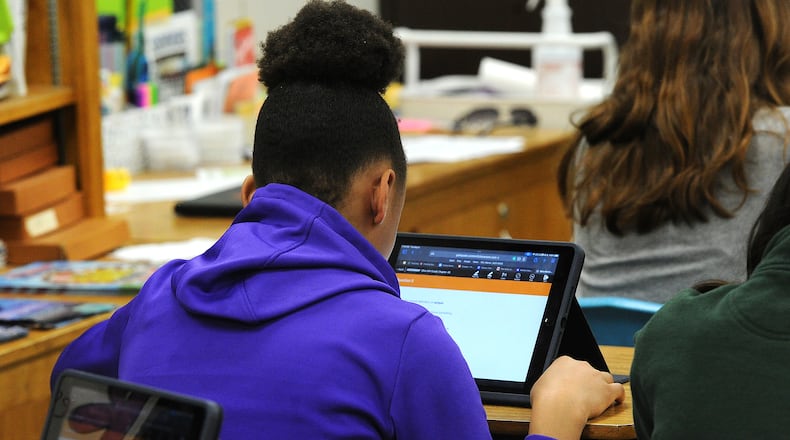House Bill 171 would change the model curriculum that students learn to include age-appropriate instruction in the experiences and journeys of many people in Ohio, including African American, Asian American and Pacific Islanders, Arab, African and North African, Appalachian, Jewish, Latin American and Native American communities.
“If these bills pass, districts will need to review the new standards and possibly make changes to their curriculum reflecting the new standards,” said Jennifer Hogue, director of legislative services for the Ohio School Boards Association.
Shannon Cox, Montgomery County Educational Service Center superintendent, said that House Bill 103, about setting standards, would have more of an impact than House Bill 171. If HB 103 becomes law, the task force could entirely change what is taught in schools, while HB 171 would change just one aspect of what is taught.
Currently, the Ohio State School Board and the Ohio Department of Education create academic content standards for the state. Under HB 103, a nine-member board would be appointed, with three members appointed by the governor, three by the Ohio speaker of the House of Representatives and three by the president of the Ohio Senate.
“It’s a pretty simple bill establishing a task force to take a look at social studies standards here in the state of Ohio and use the American Birthright documents as a starting place to look at possibly rewriting our standards and getting something that is more clear and concise,” said Rep. Don Jones, R-Freeport, who sponsored the bill.
The bill calls for the use of “American Birthright: The Civics Alliance’s Model K-12 Social Studies Standards,” or its equivalent.
The National Council for the Social Studies, a professional organization for social studies teachers, has said the standards in “American Birthright” do not align with best practices related to social studies standards.
Cox also noted that it is not a common practice to have a curriculum align with just one report unless the report is widely considered a national best practice.
“This is not an attack on our current teachers or anything our teachers are teaching,” Jones said. “It’s just, we need to take a look at what we’re doing and ask the question, are we giving our kids, our young people, the best education possible? And I think the answer to that question is no.”
If House Bill 171 passes, students in kindergarten through 12th grade would begin learning about migration patterns and cultures beginning in the 2024-2025 school year. The bill uses what’s called “model curriculum,” which is a state best practice for teaching. According to the Ohio Department of Education, model curriculum offers local educators in-depth guidance about groups or clusters of Ohio’s Learning Standards. Schools are not mandated to teach model curriculum.
“We have a much more diverse population across Ohio that we’ve had in the past,” said Rep. Mary Lightbody, D-Westerville, who sponsored House Bill 171. “The people who are from those different cultures and traditions and countries are making significant contributions to the state.”
About the Author

